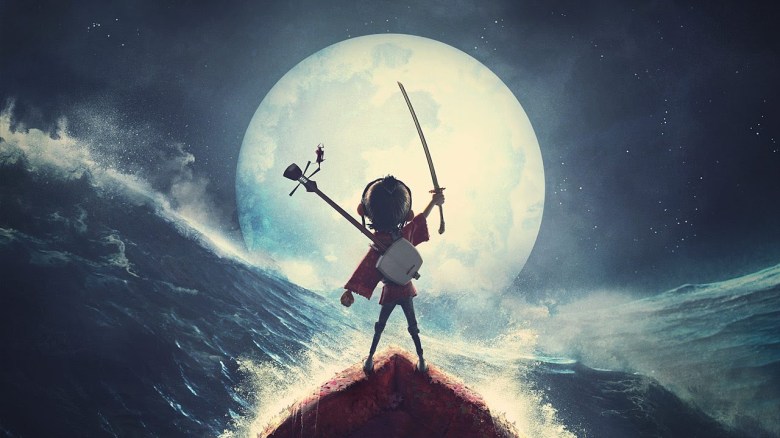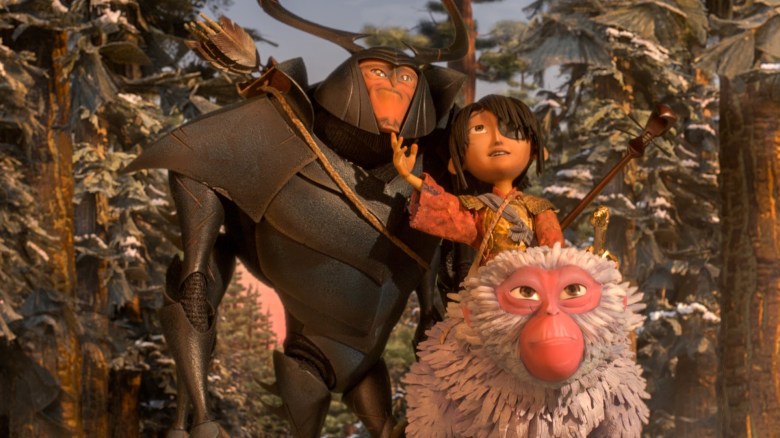By providing your information, you agree to our Terms of Use and our Privacy Policy. We use vendors that may also process your information to help provide our services. This site is protected by reCAPTCHA Enterprise and the Google Privacy Policy and Terms of Service apply.
Review: ‘Kubo And The Two Strings’ Is A Stop-Motion Masterpiece

David Ehrlich

Staggeringly beautiful and immensely true, the best animated film of 2016 — one of the year’s best films of any kind, really — is a stop-motion fable about a one-eyed boy in mythical Japan that was made by a team of gifted visionaries in an Oregon warehouse. Laika, the independent studio behind morbid enchantments like “Coraline” and “ParaNorman,” has already established itself as a formidable bulwark against the ever-accelerating onslaught of computer-generated 3D cartoons, but “Kubo and the Two Strings” makes even the most painstaking of their previous movies feel like a trial run.
A Kurosawa-inspired epic about the supreme power of storytelling, Laika’s largest movie to date is also their most emotionally acute. It may not be as grim as “Coraline” (though some of its villains are the stuff of nightmares), or as pungent as “The Boxtrolls” (though a sequence involving freshly diced fish will make you crave a post-screening salmon roll), but it digs into the darkest corners of the human heart with a degree of courage that’s seldom found in family fare, and with a dose of power that’s even more seldom found in movies geared towards adults. It’s been a brutal summer at the multiplex, but the light at the end of the tunnel is almost blindingly bright.
Blending peerlessly expressive puppetry with silky flourishes of digital effects, “Kubo and the Two Strings” begins with a prologue that introduces its characters directly into the stuff of myths. From there, it settles in to a knowingly familiar hero’s journey: Kubo (voiced by “Game of Thrones” actor Art Parkinson, who does a remarkable job of bridging the gap between adolescent energy and adult expectations), is a plucky — if somewhat somber — 11-year-old boy who lives with his traumatized mother in a rock cave on the outskirts of a small town. His father, he’s told, was a great warrior named Hanzo who sacrificed his life to spare Kubo’s remaining eye, but the kid only knows him through the stories that his mother passes down.

While the details of his lineage may be cloudy, it’s clear that Kubo is no ordinary tween. By day, he slams on his shamisen for crowds of ecstatic onlookers in the village square, and — through a stunning display of inherited magic — his every pluck at the homemade instrument has the power to move and transform the squares of origami paper that he keeps on hand. As Kubo orates about the mighty Hanzo and his three pieces of invincible armor, the papers fly through the air and fold themselves into wonderfully intricate models of the samurai and his foes. Dario Marianelli’s lush and lively score helps sell the small-scale spectacle of Kubo’s gift, while Laika’s jaw-dropping craftsmanship — which uses recent developments in 3D printing to exponentially increase the number of faces its characters are capable of making — inspires the same delighted awe from their audience that Kubo does from his own.
But Kubo never quite reaches the end of his story. Because by night — by the first hint of sundown — he’s forced to race back home and hide in his cave until morning, lest the evil Moon King spot the boy in the darkness and snatch away his other eye. Needless to say, it isn’t long before Kubo breaks the golden rule. Seduced by the sentiment of the village’s Obon Festival (a Buddhist practice in which people summon the spirits of their ancestors and then light their way back to the afterlife), and overwhelmed by his desire to speak to his father, Kubo stays out a touch too late. He’s immediately beset upon by his evil aunts, twin sisters (voiced to hollow perfection by Rooney Mara) who float above the ground, hide their faces behind unsettlingly still Noh masks, and tease plumes of black smoke from the kiseru pipes they press against their painted lips.
Kubo’s mother jumps in to rescue him, pays the ultimate price, and the next thing you know her son is sitting in the guts of a whale carcass and listening to a curmudgeonly Monkey (Charlize Theron) tell him that he find the mystical armor from his stories and slay the Moon King. Anyone who’s played a Japanese RPG (e.g. “Final Fantasy”) will be able to predict how the story progresses from there: Kubo and Monkey make their way across the map, traversing all different sorts of terrain, bantering in between boss battles, and adding new members to their party along the way (namely, a forgetful beetle voiced by Matthew McConaughey).
Even if not for the powerfully poignant script that Marc Haimes and Chris Butler have written from a story idea by Shannon Tindle, “Kubo and the Two Strings” would still be a sight to behold. There are individual shots in this movie — a lot of them — that offer enough eye candy to give you a full-on sugar rush. The Moon King may argue the virtues of being blind in a world that has seen too many terrible things to bear, but the visual splendor on display here is enough to prove him wrong.

Marking the directorial debut of Laika CEO Travis Knight (a man who’s clearly been paying attention during his company’s previous productions, and composes every gorgeous image with clear narrative purpose), the film is brought to life by an obsessive attention to detail. The animators who made this possible are wizards, and it’s a delight to watch them show off. You’ll smile at how Knight’s team uses thick flaps of paper to comprise Monkey’s hair, and you’ll marvel at how they flutter in the wind. When Kubo and his friends are forced to fight a giant skeleton — the largest stop-motion puppet ever built — you’ll feel the full weight of its enormity, and the danger it poses to our heroes. Countless animated movies have been inspired by Hayao Miyazaki, but few have been able to match the wonders of his imagination. The designs are so inspired that anything remotely derivative (such as the Moon King’s final form) stands out like a terrible oversight.
But the most striking animation here has less to do with opulence than it does intimacy. The ship that Kubo conjures from a pile of leaves is impressive, but the maternal fussiness with which Monkey musses the kid’s hair makes an even more profound impression. It’s the way the old widow in town laughs when talking about her late husband; it’s the crinkle in Kubo’s face as he delivers his shattering final line.
READ MORE: Indiewire’s Report From The Set Of ‘Kubo And The Two Strings’
Stop-motion might seem like a masochistic method, but the vibrancy it adds to a film like this more than justifies such an arduous process. “Kubo and the Two Strings” wears its borrowed Japaneseness lightly — and yes, excellent as the voice cast may be, it’s unavoidably unfortunate that Laika squanders a golden opportunity to highlight Japanese or Japanese-American actors — but it wears it with tremendous purpose. The film’s singularly Eastern conception of death resonates through every element of the story, muting a number of potential concerns about empty exoticism.
Fluently conversing with the aesthetic philosophy of Wabi-sabi, Laika endows their creations with the actual texture of time in motion. The physical reality of their characters (which is best appreciated in 3D) conveys an otherwise impossible sense of impermanence, and reveals stop-motion to be the perfect vehicle for a story about the beauty of being finite. The movies have explored the afterlife almost as thoroughly as they have life on Earth, but this one is so powerful because of the precision with which it articulates these immortal ideas of transience.

Few films have spoken so eloquently to the role that parents can play in our lives, how they shape us before we got here and stay with us after they’re gone. Monkey and Beetle may seem a bit much at first (especially Beetle, whose comic relief grows funnier and more endearing over time), but it’s extraordinary to see how these characters evolve into catalysts for the memories that Kubo has of his mother and father, reminders that the memories of the dead also preserve their strength. “Love made her weak,” the Sisters say of Kubo’s mother, but the young musician’s story makes a magnificently effective case for the opposite being true.
It’s not always easy to watch a movie that cuts through the fog of loss with the precision of a samurai sword, but “Kubo and the Two Strings” is graced with a great respect for its young audience. For kids who have lost a loved one, the film is poised to provide an essential voice for their sadness, speaking to them with a candor and honesty that most animated fare bends over backwards to snuff out. For adults in a similar position, the movie may prove even more vital. Grief is the most confusing thing there is, and it helps — it helps so much — to see something that so lucidly clarifies that life is as fragile as people are infinite, and that the stories we tell about those we remember have a way of telling us something in return.
“Memories are powerful things,” Kubo is told early on, and that sentiment is soon brought to life by a truly unforgettable journey.
Grade: A
“Kubo and the Two Strings” opens in theaters on Friday, August 19.
Get the latest Box Office news! Sign up for our Box Office newsletter here.
By providing your information, you agree to our Terms of Use and our Privacy Policy. We use vendors that may also process your information to help provide our services. This site is protected by reCAPTCHA Enterprise and the Google Privacy Policy and Terms of Service apply.
Most Popular
You may also like




















